Don't Make Plans for Nigel
At least just yet...
Quick editorial note. BBC Rethink starts its new series (and second under my watch) this Thursday with an episode on Social Housing, with none other than Mayor of Manchester Andy Burnham as a guest, plus me walking around a social housing project with bird song and motorcycle noise in the background. We have episodes on Rethinking the Civil Service, Productivity, and Britain’s Relationship with China just around the corner too. Now, back to the main programming.
Another week goes by. Another set of disappointing polls for Keir Starmer. Another set of obvious briefing in the right-leaning press against Kemi Badenoch. Another slew of headlines predicting Nigel Farage as Prime Minister.
And just four more years of this to go.
Regular readers of this Substack will know that Reform UK surged dramatically during the local elections, winning control of several councils, a few metro-mayorships, and hundreds of new counsellors. On the back of that, Reform have consistently polled in the high twenties, occasionally grazing thirty points. In our new Lilliputian era, where political parties struggle to amass a quarter of the vote, this makes them the Gulliver.
What remains to be seen is whether Gulliver can, as in his Tales, be tied down by down by Britain’s legion of minor parties, which now includes such well-known crowd favourites as ‘the Conservative Party’ and ‘the Labour Party’. Memba’ them?
Far be it from me to inadvertently manifest Nigel Farage as future Prime Minister by downplaying the probability, but I still feel that the press have got a little over their skis on this one. Since I’m on record in that bastion of elite-thinking, the Financial Times, as saying I think there is only a 10-20% probability of PM Nigel Farage (aka PMNF), I should probably explain my thinking.
Plus I also got the chance to update my ‘famous’ 2029 Prediction App to allow tactical voting by both Reform and Conservative voters (for each other!), so this gives me the chance to show that off too. OK, so why do I think Prime Minister Nigel Farage is still a relatively unlikely outcome? Here we go…
Four Years is a Long Time
It sounds obvious because it is. It is hard to imagine a world in which the government does not delay the next General Election to 2029. Hell, that’s why I called my app the 2029 Prediction App. Governments usually call elections before they have to only when their majorities are thin or absent and they think they can boost them. I put it to you, reader, that Labour are never going to increase their current ginormous majority. The only situation I suppose one could envisage where there is an early election is if the Labour Party actually splits. All things are possible, but this would be an impressive act of self harm.
So why does the distance to the election matter? Well, four years is basically forever in political time. An aeon. The British economy, say it quietly, is actually doing OK at the moment. The reset with Europe may deepen, pushing up trade. A couple of sort of useful trade deals elsewhere have been signed. The pound is strengthening. The labour market remains buoyant. Interest rates and inflation are declining. The question is, will people feel the benefit or will the state of the public services remain sufficiently dire to still deep-six Labour?
It’s hard to know what with it being the future and all. But I think it is worth reminding ourselves that in terms of the economy and public services there is still all to play for. There are plenty of threats out there - the continued wars and crises in Ukraine and the Middle East, AI eating up all our jobs, the Trump tariffs - but there is also a path to a normal government victory.
And speaking of Donald Trump. Assuming… well one cannot assume much I suppose. So then, supposing a non-terrible scenario - that Donald Trump does not override the 22nd Amendment somehow and run again - the current US President will not be on the ballot in 2028. Moreover, by 2029 we will know who their successor is.
Let’s just imagine that the remaining years of the Trump administration have not been a roaring success, either in the US (quite likely) or the for the rest of the world (extremely likely). In my last post I noted how successful Mark Carney and Anthony Albanese had been at focusing their candidacies around standing up to Donald Trump, and hinting that their opponents were too Trumplike. I also noted that Starmer has been shying away from this for understandable reasons.
But in 2029, Starmer’s reluctance to push back explicitly against Trumpism won’t matter in the same way. It’s true we could have President JD Vance, who I suspect won’t treat anti-MAGA rhetoric kindly. But Vance is not Trump and does not have the latter’s electoral superpowers. So, this likely opens the space for Starmer (or his successor…) to push back on MAGA-inflected opponents.
You will notice I have not mentioned Mr Farage until now. And that’s because ultimately the key player in the next election is the incumbent government. There are only two kinds of election out there - ‘stay the course’, or ‘time for a change’. Labour have to keep focused on making the former direction seem more appealing than the latter. And they, importantly, have all the necessary levers to do that. They control public spending, they (ought to be able to) control the media grid, they control foreign relations. And people, whether they like him or not (and they mostly don’t) can see Keir Starmer as Prime Minister.
The Most Important Poll of All
And speaking of that, this is the major challenge for Nigel Farage. Even though his approval ratings are higher than they have usually been, even though Reform is clearly leading in the current polling, there is one poll where he is struggling massively: who would be the best Prime Minister?
If you want to become Prime Minister, this is probably a weakness.
Below is YouGov’s latest polling on the best prime minister question. It is striking how poorly Farage performs in comparative terms.
Starmer has a 15 point lead over him. Davey has a 14 point lead over him. Even Kemi Badenoch - who seems to be halfway through a concerted putsch by the right-leaning press to remove her - has a 4 point lead over him. Fans of political science will be interested to learn that Keir Starmer is in fact a Condorcet winner, in that he wins a majority in each pairing. So, he’ll always have that I guess.
If you simply looked at the individual approval ratings for each leader, you would have a very different rank ordering. Starmer is incredibly unpopular on this dimension - he has a net approval of MINUS 46 (his worst ever). Badenoch’s is a dismal MINUS 39. By contrast Nigel Farage is sitting pretty at the heights of MINUS 27. Oh, and like the media I forgot Ed Davey, who has a net approval of MINUS 8.
A couple of things to take from this. First, Nigel Farage is not in fact that popular. Minus 27 when you are not the leader of an incumbent government is really quite poor. I mean it’s not Kemi Badenoch poor, but she is an a class of her own. In opposition you would be looking for mildly unpopular net approval ratings like Ed Davey’s.
And second, Farage is losing on the ‘best prime minister’ metric to people who he clearly bests in terms of approval ratings. And this gets to his problem - he has never been in charge of anything except political parties. He was even kept off the Leave campaign. He may well be charismatic and a political genius of sorts. But is he a leader that people trust to run the country? Not yet. Perhaps not ever.
Does the Right Vote Tactically?
I did promise that the app would be back. So here it is in its latest incarnation.
For those unfamiliar, the app allows you to plug in current opinion polling at the national level and see how that would play out in each constituency (using Uniform National Swing, though one can also shift it to Proportional Swing and god knows which will be more accurate in the next election). It also allows you to shift voters tactically within blocs. I have always permitted you to shift Labour, Lib Dem and Green voters to whoever did best in the last election. But in previous iterations of the app, I just had a slider moving Reform voters en masse (i.e. in every constituency) to the Conservatives - a bit like what happened in 2019.
But there are two problems with that latter assumption. First off, it implied that Reform voters could be shifted to support the Conservative Party but not vice versa. And second, that the right bloc would not vote tactically, for whichever of the Conservatives and Reform were best placed in a particular constituency. That may have been true in the past - I suspect it is not today. And I also suspect that the amount of tactical voting might vary across Conservatives and Reform voters, so I now permit you to adjust either.
Why does this matter? Right now, Morgan McSweeney’s electoral strategy for 2029 appears to be to assume that Reform will be his main opposition and that push-come-to-shove, Lib Dems and Greens will vote tactically to keep Farage out of power. And given what we see in the best Prime Minister ratings that might not be mad. Though it does assume he has not mortally offended Lib Dems, Greens and half the Labour Party by that point with macho Blue Labour bicep-flexing.
There is also another hidden assumption here - that the right bloc won’t vote tactically to the same degree as the left bloc. And hence the right will be split, permitting another Labour majority government or in the worse case scenario a Lib-Lab coalition. And he might be right.
The thing is, though, we don’t really know that much about right wing tactical voting because in the past, the Conservatives were the only game in town, and as UKIP/Brexit Party/Reform emerged in recent years, the closest parallel we have is 2019, where Farage stood the Brexit Party down in Conservative held districts, which is sort of like forcible tactical voting for Brexit Party supporters.
The other day, Sam Freedman argued that we might be seeing asymmetric tactical voting on the right - with Conservative voters shifting to Reform but not vice versa. Given the general distaste the British public have for the last Conservative government and the fact that long-time Reform voters are almost-definitionally fed up with the mainstream parties, this isn’t hugely surprising. It might also look like good news for Nigel Farage.
But I’m not sure it is.
Let’s play with the app a little. And start by considering what would have happened in 2024 if every Conservative in a district where Reform beat them had backed Reform instead and vice versa. In other words, the right bloc always votes fully for one of the parties. Surely this would have kept the Conservatives in power, right? Well…
Despite the fact that Labour only won just over a third of the vote, this would also leave the Conservatives and Reform quite a way back from a parliamentary majority even combined. I suspect this would have ended up with some kind of weird Labour minority government (or possibly coalition with the LDs) dependent on support from the SNP, Plaid and the Greens. It would have been very unstable. But it still wouldn’t have produced a right-wing coalition. And if we shift to my usual assumption of thirty percent tactical voting on the right, we would just have had a somewhat smaller Labour majority.
But that’s last year. And now we are in Nigel’s world, where Reform are polling around thirty percent. So let’s have a look at how tactical voting on left and right work in this world.
I’ll use YouGov’s most recent poll - Reform 29, Labour 22, Lib Dems 17, Conservatives 16, Greens 10, and I’ll keep SNP and Plaid the same as in 2024 because YG has SNP bobbing back and forth between 2 and 3% and they got 2.6% last time. Here’s what you get with no tactical voting on a uniform swing.
Oh look, PM Nigel Farage! Or is it… because a working majority (given the Speaker and Sinn Fein) is circa 321 seats. And Reform plus the rump Conservatives just have 307 seats. I am confident the Protestant parties of Northern Ireland (not in the graph) would ally with them but that’s still only seven more seats (314). In the meantime you could have a mad rainbow coalition of Labour, the Lib Dems, the SNP, the Greens and Plaid (311).
And so that means no-one would have a majority without the support of ‘Other’. I should note that the app does not include Northern Ireland, so ‘Other’ here means a variety of candidates elected in districts with large Muslim populations concerned about Gaza. Oh and Jeremy Corbyn. So, this is how we get Prime Minister Jeremy Corbyn. At long last.
Now presumably, Reform could do better with tactical voting. Yes, but it depends. It depends on how tactical voting works. If we use my usual assumption for tactical voting on the centre-left - thirty percent of people do - and apply it only to the right, directing people to vote for whichever party did better in 2024, we get this.
Congratulations Prime Minister Badenoch! Well, perhaps. Because again the Conservative and Reform coalition doesn’t quite make a majority (304 seats). The problem here is that although Reform came second in many seats around the country, in a lot of them they did so already by cannibalising the Conservative vote. So giving them another bunch of Conservative voters only helps so much. And the bigger problem for PMNF is that the Conservatives came first or second in more places than Reform. In other words, this model of tactical voting helps most the party who did better last time.
So what if we assume Reform lose no voters to the Conservatives but Conservatives vote tactically, as Sam Freedman suspects?
Well then we are back in the situation with Reform quite close to a majority but having decimated the Conservatives so royally that a coalition with them still cannot cross the line. If you add the 7 Protestant MPs you get exactly 320 seats, which given seven Sinn Féin MPs and the Speaker maybe leaves you one vote short of a majority. I mean just imagine how fun this would be.
And here’s the deal, I haven’t yet activated McSweeney’s emergency plan of getting everyone on the centre-left to vote tactically too. I have only allowed tactical voting on the right. So let’s see what happens if all voters vote tactically at a rate of thirty percent (including Reform voters).
Morgan, you’re a genius. It’s true you lost Labour’s enormous majority but that’s OK because a Lib/Lab coalition has indeed kept Nigel out of power. Except, it seems to have helped the Conservatives because we had Reform voters vote for them. What if we don’t?
Ah still pretty good. Except for Kemi Badenoch.
Oh but one more thing. What if Green voters hate Labour because of all the Blue Labour preening and refuse to vote tactically? Ah…
Well that hurts. I mean Labour can cobble together a three party coalition so I guess it’s not terrible but they fall short of Reform’s numbers. And we do get close to, if not PM Nigel Farage, LOTO and future-PM Nigel Farage.
So, that was a fair few graphs. But I hope what you have learned is that one cannot simply add voters on the right together and assume it leads ineluctably to PMNF. It depends on how right voters vote tactically and there is a major coordination problem, not least because Reform voters hate the major parties, including to at least some degree the Conservatives. And if the left can manage tactical voting then yes they can keep Nigel out of power but that rather heavily relies on not massively pissing off Green voters (or indeed Lab or LD voters).
Big Dog Bites Back
Gosh, lots of moving parts there. Don’t you wish for a simpler time? When a ‘world king’ ‘squatted like a bullfrog’ across British politics? A blonder time. A more fecund time. A time of japes and lies.
You see there is one more problem for the concept of PM Nigel Farage and that is his kryptonite - another charismatic, cakeist, hard-to-pin-down, holiday-loving rival with a love-hate relationship with Europeans. Boris.
So many of the things we now hear about Reform’s coalition - right on social issues, leaning left on economics, upset with boring traditional parties, excited about someone willing to shake the system up - apply to someone who was Prime Minister of this country just three short years ago. Someone who has unfinished business. Or perhaps unfinished leisure. Hard to know. But anyway, someone who wants back.
The Conservative Party faces the following problem. Kemi Badenoch is probably a holed ship. It’s hard to see how she can recover among either the party or the public from a dire start. In the spirit of her ‘too-online’ personality, I suspect she will soon be ‘cancelled’. But then who next? Robert Jenrick has been lining himself up with all the subtlety of Sam Allardyce waiting to take over from a doomed manager in the relegation zone. Yet, I suspect he will struggle against Nigel Farage’s genuine beliefs and genuine charisma, given Jenrick’s apparent deficit in either.
Now, if I had my druthers we would have reversed time and James Cleverly would have won an eminently winnable leadership campaign because someone would have drugged Grant Shapps to prevent him from being too clever in running it (into the ground at the last moment). Cleverly is a clearly conservative but moderate-inflected, hail-fellow-well-met, jokey, previous holder of (two) of the great offices of state.
But you know who else meets those criteria? I suspect the Conservative Party will do exactly what they ended up doing when in very similar sorts of trouble in 2019 - smash the glass, hit the emergency button, and Bring Back Boris.
I also suspect this will work. Yes the British public are fed up with Boris. But let’s face it, they don’t really like anyone else either. And as Duncan Robinson recently noted, we have unfinished business with Boris, just as he does with us.
If (when) Boris returns it will suck all the oxygen out of Farage’s room. The right-wing press will hail their returning hero. The Conservative Party will find some élan once more. Johnson will swipe away Farage with a few demeaning witticisms and we will be back to 2019 all over again. Perhaps we can forget Liz Truss ever existed.
Will Boris win an election for them? Maybe. Does it even matter? We will dance to the old tunes. Though some of us may end up standing forlornly in the corner, wondering what happened to our chance of being Prime Minister.
Or perhaps Boris won’t come back. Perhaps right-wing voters will learn how to vote tactically, while left-wing voters refuse to in a fit of pique at Morgan McSweeney. Perhaps Nigel Farage will edge up in the ‘best Prime Minister’ stakes and perhaps the next four years are calumny upon calumny for Labour.
I said earlier on that my estimate for PMNF is about 10-20%. But that kind of chance happens all the time. Indeed, I’m sure the chances of my favourite football club - and it turns out Nigel Farage’s too - winning the FA Cup were substantially under that.
Did you really think I’d get through this whole post without mentioning CRYSTAL PALACE ARE FA-CUP WINNERS!?! More fool you.
Sometimes surprises still happen. Sometimes they cause joy. But at other times woe.


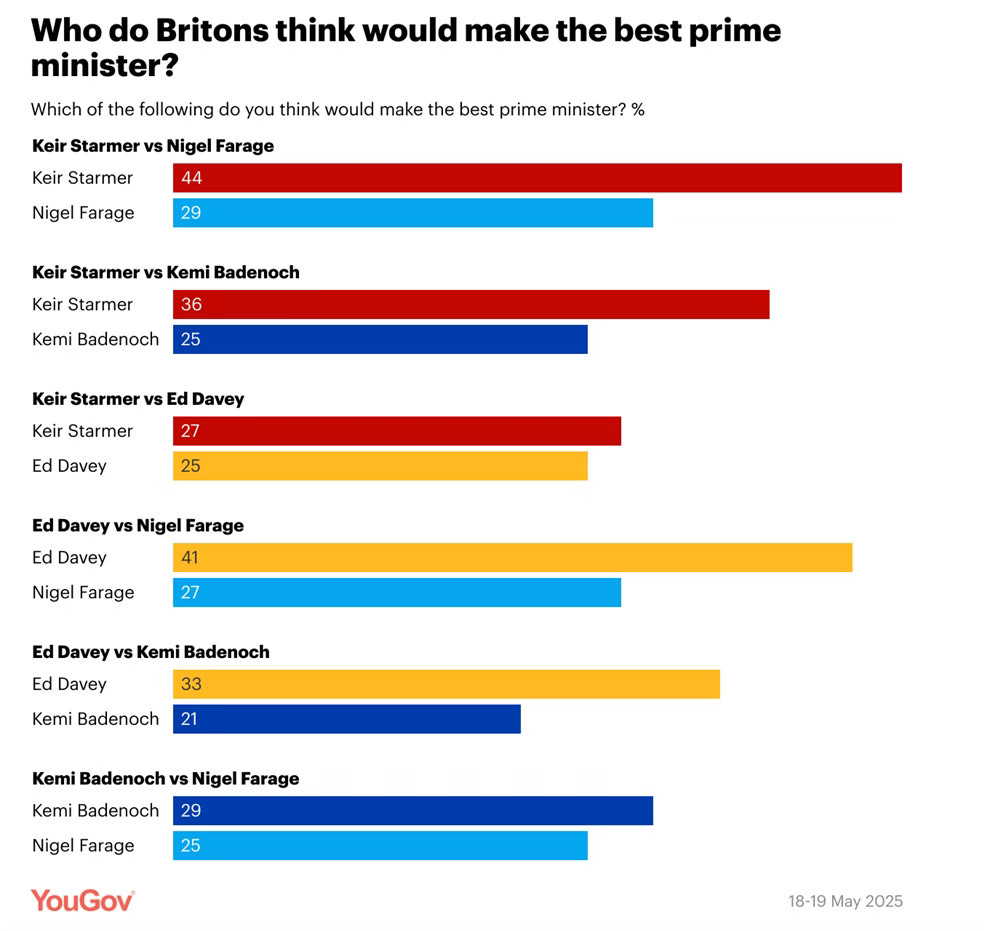
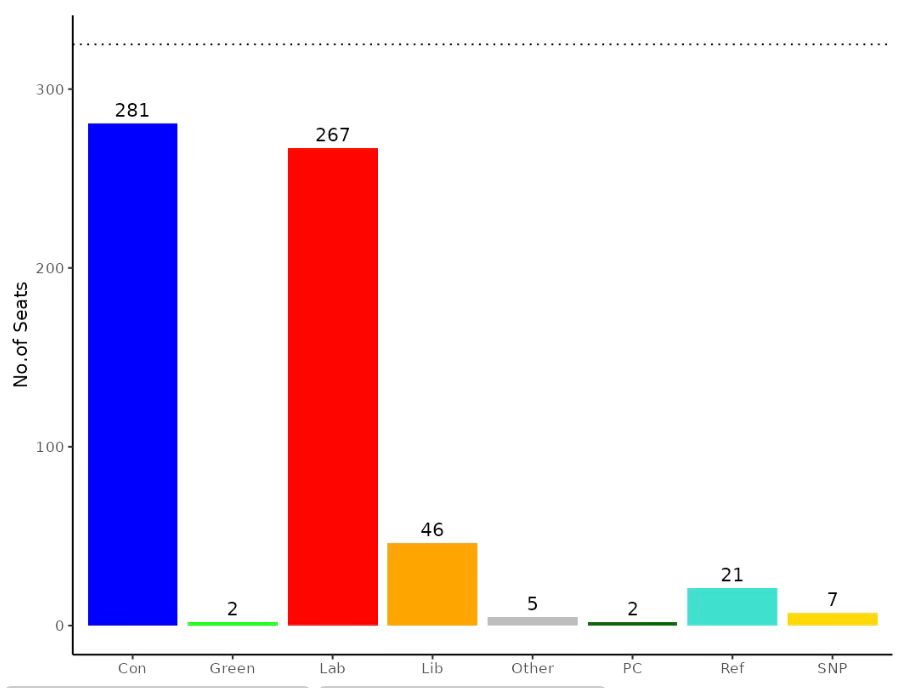
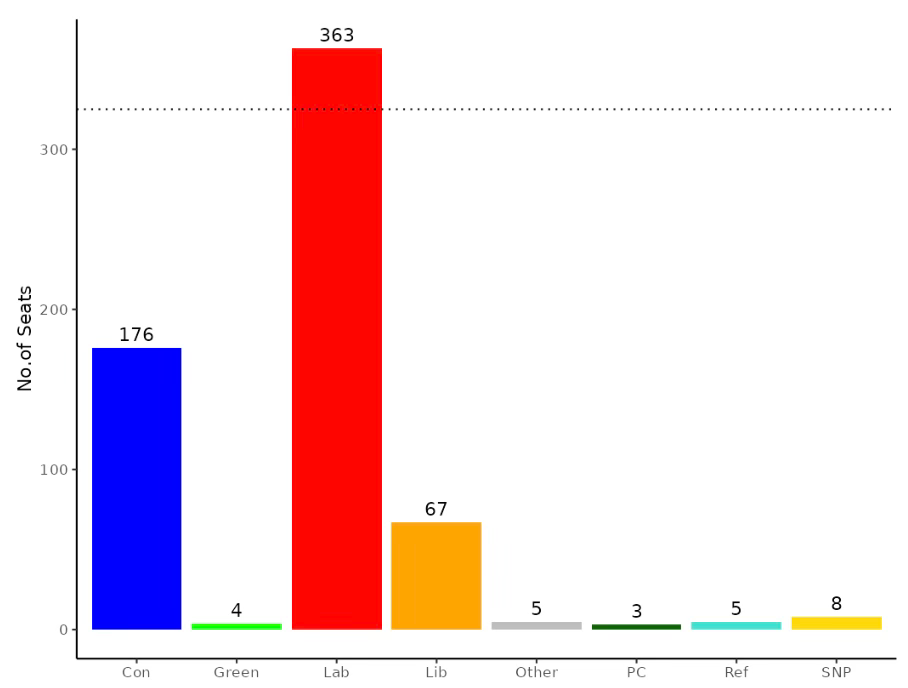

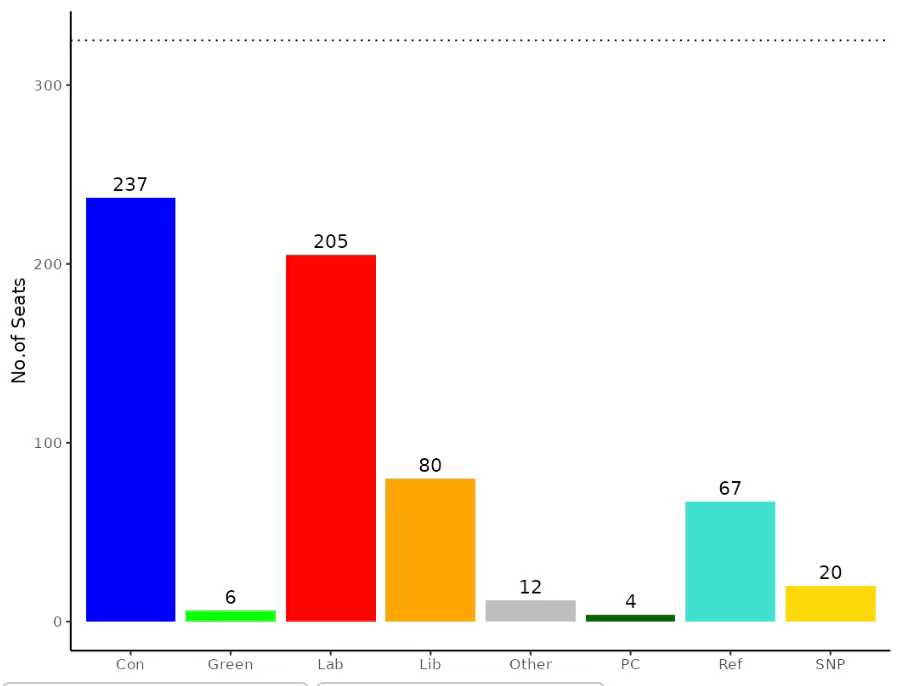
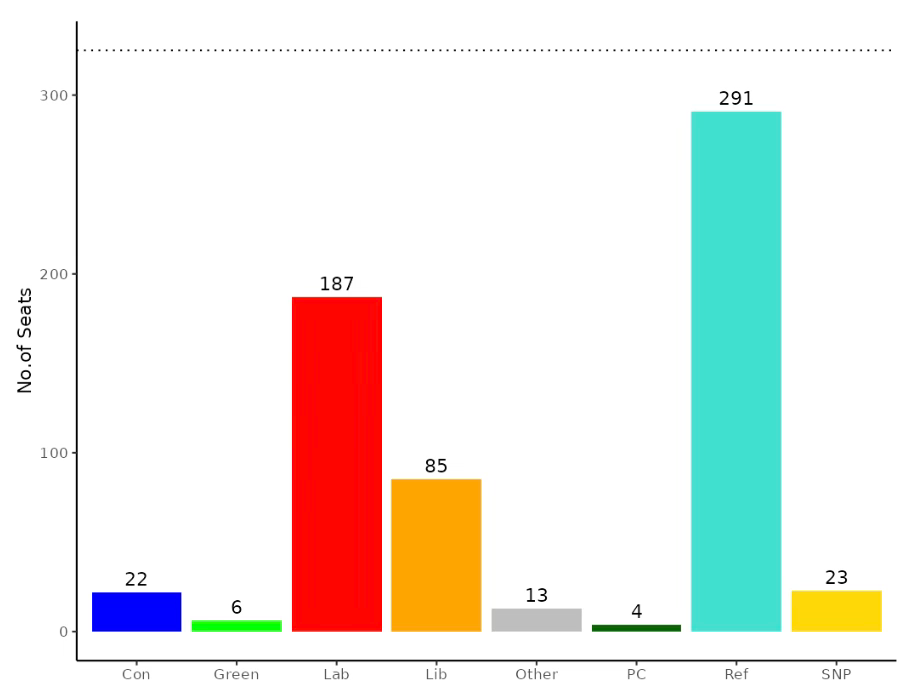
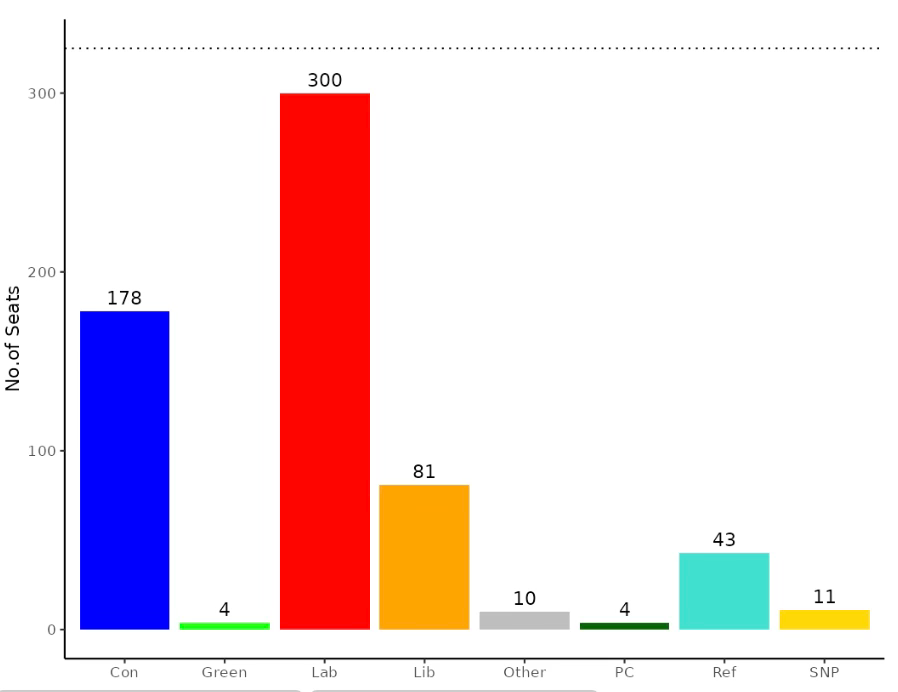
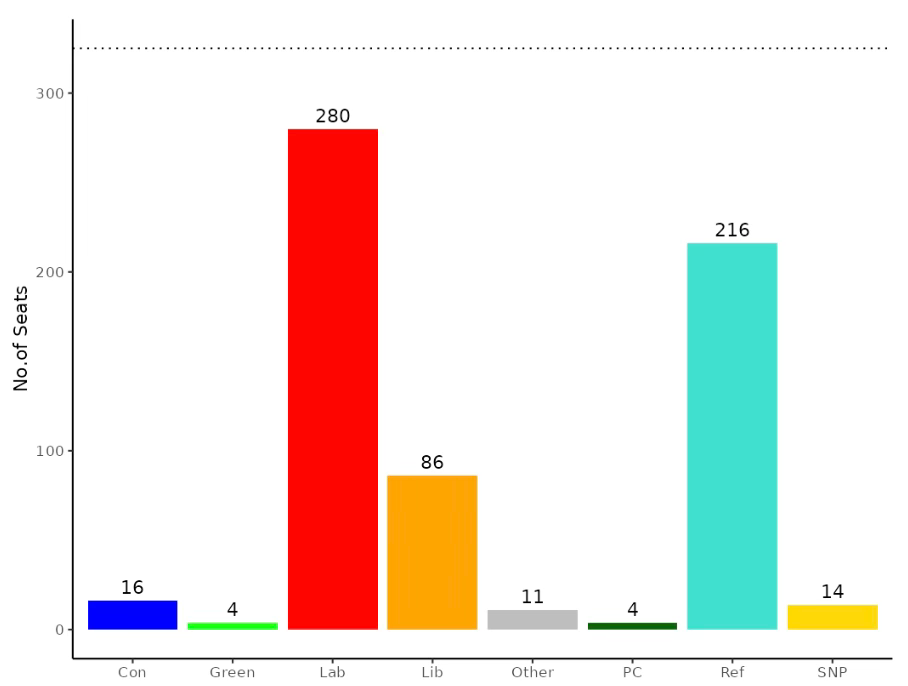
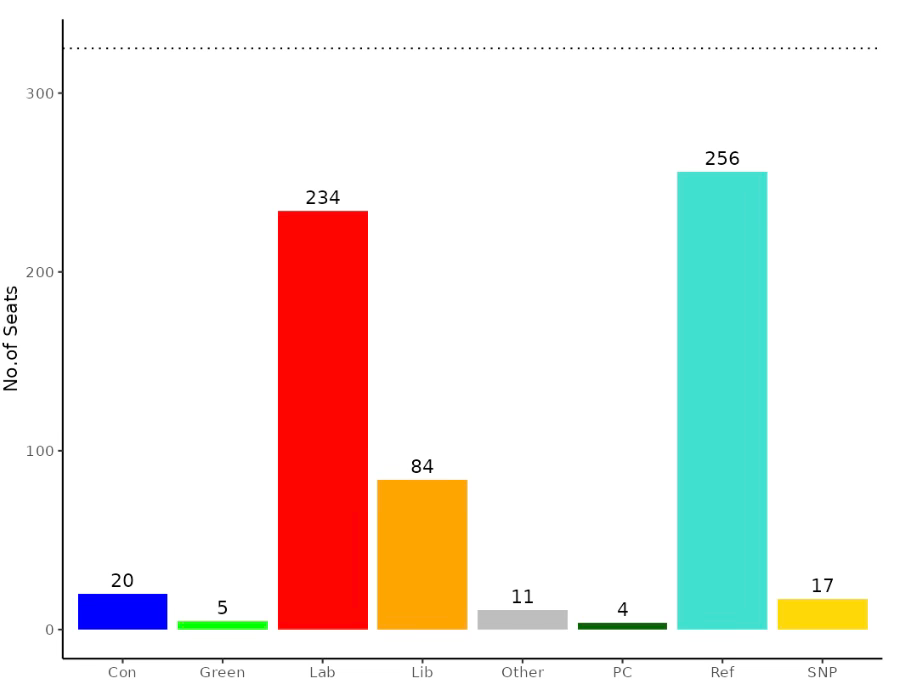
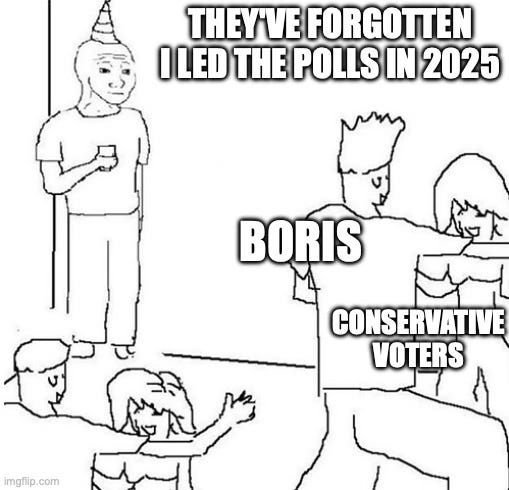
Great piece! I agree with much of it, including the overall probabibility (4 years is indeed a long time!). I'm not so sure about Boris returning, or that it would go as well as you suggest if he did.
On tactical voting, though you discuss it, I do think you (and quite a few others I see on the centre left) are underestimating the incumbency penalty, and quite how much Labour may be disliked in four years - particularly if we have repeated tax rises, borrowing increases and public spending cuts. Having seen this from the inside on the right last year - where so many lifelong Tory voters simply would not turn out for them - I wouldn't underestimate the chance of a similar thing happening the other way round.
A small point about how long this Parliament will run. I think a plausible (though not likely) scenario is an unpopular PM exits and his successor calls an early election?